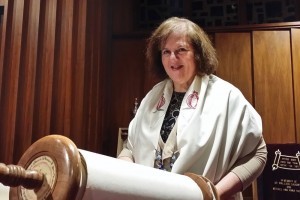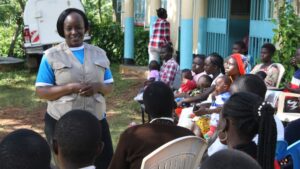Beth El’s Rabbi Steven Schwartz wasted no time last Sunday afternoon in noting the significance of having rabbis from four distinct streams of Judaism on the stage of his Pikesville synagogue’s Offit Auditorium.
“It’s all too rare,” Rabbi Schwartz said shortly before the panelists were introduced at Beth El’s interdenominational symposium Nov. 20th titled “Love Your Neighbor As Yourself.”
The topic presented the opportunity for an examination of a commandment that seems particularly relevant amid the current climate of intense and often acrimonious political and social media discourse.
The annual program, an initiative of the Rabbi Mark G. Loeb Center for Lifelong Learning, honors H. Allan Lipsitz, Beth El’s program director for adult education who passed away in 2007. Lipsitz, a firm believer in celebrating each flavor of Judaism, would have likely relished the medley of opinions and interpretations on display at the gathering.
Panelists included Rabbi Geoff Basik of Kol HaLev Synagogue (Reconstructionist) in Northeast Baltimore; Rabbi Gila Colman Ruskin of Temple Adas Shalom (Reform) in Havre de Grace; Rabbi Shmuel Silber of Suburban Orthodox Congregation Toras Chaim in Northwest Baltimore; and Rabbi Robert L. Tobin of B’nai Shalom (Conservative) in West Orange, N.J.
More than 100 people attended the symposium, which Rabbi Schwartz moderated.
In their talks, each rabbi used research or commentary from Jewish texts and personal experiences — or a blend of the two. The talks were followed by question-and-answer segments.
“Even if you learn absolutely nothing this morning,” Rabbi Silber said, “that such an event like this took place in attempt to learn to love one another … to come together for something so beautiful like this is absolutely amazing.”
One of Rabbi Silber’s key points centered on tempering the lofty expectations associated with the biblical commandment of “Loving your neighbor.” He explained that the commandment may not instruct people to love just anyone, but to refrain from doing something negative to others.
Ultimately, he said, respect is paramount.
“It’s wonderful to say we should love each other, but it’s a tall order,” said Rabbi Silber. “Let’s start by not hurting one another. Let’s start by having compassion for one another. When we do that, perhaps over time the love will follow. … More important than loving one another is respecting one another. Respect is the prerequisite to love.”
Rabbi Tobin, who previously served as an associate rabbi at Chizuk Amuno Congregation in Pikesville, emphasized that people should note the specific word choice of “neighbor,” as opposed to “family” member or “friend.”
“This person is someone distant from you. They are not intimate to you,” Rabbi Tobin said. “The Torah is commanding you to love someone you might not necessarily think you’re supposed to love.”

Rabbi Ruskin said serving as a chaplain at two mental health facilities in Baltimore gave her the impetus to explore the commandment on a deeper level.
“We encounter those who are mentally ill all the time. But do we love them?” Rabbi Ruskin asked. “Do we apply [the commandment] to those people in our community struggling with depression, psychosis, addiction, anxiety, speaking disorders, eating disorders? … Do we greet them with love and acceptance? This is one of the biggest challenges for us.”
Rabbi Basik examined the commandment with respect to the Musar, a Jewish ethical, educational and cultural movement developed in the 19th century. When loving one’s neighbor, he said, the action isn’t always as significant as the intention — or lack thereof — behind it.
“It’s not enough to do something,” Rabbi Basik said. “The hand teaches the heart, but often times what’s in the head doesn’t reach the heart. This is the problem — how to get something like ‘Love thy neighbor’ inside. We need other mechanisms beyond rational thoughts, parsing texts, beyond physical performance even.”
The prevailing theme among the rabbis at the symposium was maintaining a spirit of respect, civility and understanding among people of all backgrounds and beliefs.
“The goal is to love but until that great day, the goal is to respect,” Rabbi Silber said. “Agree to disagree with dignity. Focus on what we have in common instead of focusing on that which divides. We’ve started that process just by being here.
“It’s so cold outside, but it’s so warm in here — and I don’t mean just the thermostat.”
David Snyder is a Baltimore-based writer.
Top photo of (left to right) Rabbis Gila Colman Ruskin, Shmuel Silber, Geoff Basik, Robert L. Tobin and Steven Schwartz at Beth El Congregation on Sunday by Judi Snyder





